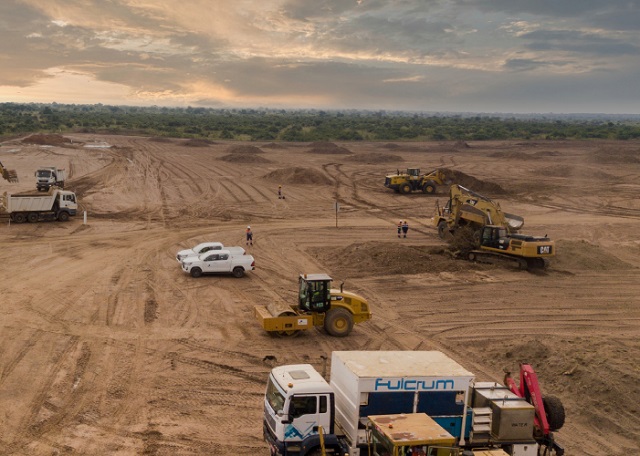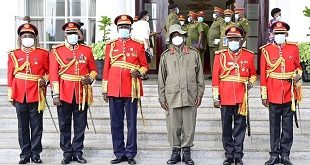
Kampala, Uganda | RONALD MUSOKE | As the construction phase of the L. Albert Oil Development Project gathers pace, focus has now turned to how best local entrepreneurs in the agriculture and housing sectors can maximise opportunities the oil industry is attracting into Uganda.
Two studies were launched on Feb. 03, just two days after the international oil companies signed off their final investment decision (FID) for three key oil projects. Close to US$10bn was committed to the project by TotalEnergies and the China National Offshore Oil Corporation (CNOOC).
The consortium of partners includes; Stanbic Bank Uganda, aBi Finance, the Economic Policy Research Centre (EPRC), Stanbic Properties Limited, and the Petroleum Authority of Uganda (PAU)— the government agency in charge of monitoring and regulating the exploration, development, production, together with refining, transmission, and storage of petroleum in Uganda.
Among the agreements signed, Stanbic Bank, aBi Finance, and the petroleum authority agreed to invest about Shs 350 million to contract the services of EPRC—a Makerere University-based think-tank that specializes in economics and development policy-oriented research and analysis—“to define the linkages between agriculture and oil and gas sector development in Uganda.”
The study is expected to estimate the current and future demand and supply, assess status of standards, as well as active agricultural enterprises with the potential to harness capacity to ably absorb emerging opportunities linked to the oil and gas economy which is expected to drive demand as the country enters the production phase.
Senior government officials say the final investment decision will unlock investments in the region of US$15bn over the next three years. The construction phase, experts say, takes almost 70% of activity and therefore provides the majority of jobs and service opportunities in the industry. The officials say the government wants a significant proportion of these investments should go into the pockets of Ugandans.
According to the seventh and eighth objectives of the 2008 National Oil and Oil Gas Policy, the international oil companies are required to employ Ugandans and utilize locally available goods and services. But, until the recent commissioning of the studies, little is known of how local farmers or even real estate entrepreneurs are prepared to tap into the emerging oil and gas industry.
Opportunities galore
In April, last year, host government agreements between the oil companies and the governments of Uganda and Tanzania, TotalEnergies and CNOOC were signed in both Entebbe and Chato in Tanzania. At the same time the oil companies were concluding their procurement process and immediately started dishing out contracts for their flagship projects including; Tilenga which is under the stewardship of TotalEnergies) and Kingfisher (CNOOC) as well as the East African Crude Oil Pipeline.
The Tilenga project’s main Engineering Procurement Supply Construction and Commissioning (EPSCC) contract were awarded to the consortium of McDermott and Sinopec which have since started work. The two companies are currently taking forward detailed engineering and other activities in London, Beijing and Gurugram in India.
Ten other contracts for drilling and management of wells for the Tilenga Project have also been issued. ZPEB Uganda Company Limited which won the contract for construction of the drilling rigs, and the detailed design of the drilling rigs is already working on its assignment. The rigs are to be used in drilling up to 426 wells, scheduled to commence in the last quarter of 2022.
The contract for civil works to prepare over 700 acres of industrial area for the Tilenga project was awarded to Mota Engil Uganda. These works include bush clearing, fencing, construction of drainage and internal roads and preparation of the ground to host different facilities. The facilities to be hosted in this industrial area include the Central Processing facility (CPF), construction camps, drilling support bases, and operation support bases, among others.
Mota Engil Uganda has sub-contracted various Uganda companies included Gauff Consultants, Prand Engineering, Civtec, Fabrication Systems among others to undertake some of these works. Preparation of the Tilenga industrial site was at 35% completion at the end of 2021 and expected to be concluded by mid-2022.
A contract for construction of pads on which the wells for the Tilenga project will be drilled was awarded to MotaEngil Uganda Ltd. This contract includes preparation of 31 well pad sites, installation of conductor pipes and construction of well cellars among others. The work is expected to commence in the first quarter of 2022, in preparation for the commencement of development drilling in the last quarter of 2022.
A contract for civil works and construction of well pads 1, 2 and 3 for the Kingfisher project together with construction of infield access roads was awarded to Excel Construction Limited, a Ugandan company. Additional contracts for Kingfisher project, including drilling and well services are due to be awarded during 2022.
A contract to design and construct a permanent camp, supply base and safety/security check station. Kingfisher Project EPC-2 infrastructure facilities was awarded to China State Construction Engineering Corporation Ltd (CSCEC).
On Feb.13, CNOOC Uganda Ltd gave the procurement and construction contract to another local company, Excel Construction Ltd to construct the well pads, access roads and water intake points. Excel Construction Ltd is expected to finish work by the end of this year.
According to senior officials in the Petroleum Authority of Uganda, the sector is fast transitioning into the development phase in preparation for the sustainable production of Uganda’s petroleum resources in the coming months.
These months, PAU says, will be characterized by intensive activity, as FID unlocks the detailed engineering, procurement and construction (EPC) phase for the projects, where the bulk of opportunities lie. This is critical for the Ugandans and Ugandan firms that have and continue to develop the required capacity to harness these opportunities.
Speaking at the commissioning of the study, Ernest Rubondo, the executive director of the Petroleum Authority of Uganda noted that once completed “the study will be a very useful item” in the government agency’s policy tool-kit.”
“As the regulator, we are always looking out for ideas that ensure greater local participation in the oil and gas sector. The supply of foodstuffs is one area where local farmers can become key players,” Rubondo said.
He added: “However, this will require them to commercialize their farming methods, particularly by getting together and forming partnerships amongst themselves to benefit from economies of scale that enable higher output to meet the expected high demand.”
Irene Batebe, the permanent secretary in the Ministry of Energy and Mineral Development noted that in order to ensure that there is maximum benefit to the economy as imagined by the studies, there is need to have clear strategies informed by empirical data on how sectors such as housing and agriculture can be linked to the oil and gas sector.
For Emma Mugisha, the executive director of Stanbic Bank, the signing of these agreements could not have come at a better time when government has just announced the Final Investment Decision on the Lake Albert Development Projects which comprise the Tilenga and Kingfisher central processing facilities and the East African Crude Oil Pipeline (EACOP).
“The EACOP is opening the stage to opportunities worth billions of shillings; while all this is exciting news, it is important for local investors to be guided by research to help them make informed investment decisions,” she said, “We are therefore pleased to be part of the solution and looking forward to helping Ugandans get the most of agriculture sector opportunities linked to the oil and gas economy.”
Deus Muhwezi, the commissioner extension services at the Ministry of Agriculture, Animal Husbandry and Fisheries noted during the launch of the studies that agriculture is the major end user of the oil and gas sector.
Mona Muguma-Ssebuliba, the chief executive officer of aBi Finance, a multi-donor agency devoted to developing agribusiness opportunities in the private sector said when the study is finished, it will guide the agency where interventions that create the most positive impact for farmers in the vicinity of the oil fields can be made.
In another agreement, the petroleum authority has contracted Stanbic Properties Uganda Limited to “undertake a baseline study and project the future supply and demand of housing, cost and availability of land, cost and availability of building materials and housing preferences and delivery systems in the Albertine region.”
Stanbic Properties intends to study the real estate market and analyze all real estate segments including; the residential, office, retail, hotel and industrial space in the ten districts the EACOP will traverse. The pipeline covers 296km and traverses 22 sub-counties, four town councils, 41 parishes and 170 villages and hamlets in the districts of Hoima, Kikuube, Kakumiro, Kyankwanzi, Mubende, Gomba, Sembabule, Lwengo, Kyotera and Rakai as well as the neighboring districts of Masindi and Pakwach.
Stanbic Properties has been asked to analyze the strengths, opportunities, weaknesses, risks, and threats in the housing market in the Albertine region and the identified EACOP districts, to establish the current feasible incentives along the housing value chain provided by government, non- government entities and the private sector which can complement investment.
Stanbic Properties has also committed to undertake studies to help identify areas with land available for housing development and the modalities of land acquisition by investors; and to develop a housing strategy action plan with costed measures, an implementation road map, and an implementation process map for the realization of identified opportunities.
Dorcus Okalany, the permanent secretary in the Ministry of Lands, Housing and Urban Development noted that there is apparent need to align the housing interests with the demand that will arise from the oil and gas sector. She said housing is very critical for Uganda and the study would define the gaps and needs in the housing sector.
“There is an apparent need to align the housing interests with the demand that will arise from the oil and gas sector. Housing is very critical for Uganda, and we believe this study will define the gaps and needs in the housing sector.”
For instance, according to a Kampala market performance review prepared by Knight Frank, one of Uganda’s leading real estate firms, the signing of the EACOP and the tariff and transportation agreement which opened the way for the development of the Lake Albert Development Project in the second quarter of 2021 resulted in a marked increase in inquiries across asset classes (office, residential and industrial space).
The report noted that the inquiries were largely driven by the oil and gas sector and private consultancy firms with space requirements in the range of 150-1500 square metres.
The same report noted how the signing of key oil agreements in April, last year, Knight Frank registered an uptick in development activity among the property developers with landlords hoping for increased take-up and improved rental offers for prime, private rented accommodation.
The pipeline will create short term (2-3 years) employment for both highly skilled and semi-skilled professionals, and casual labourers. It is expected that casual workers who will be involved in the construction phase of the projects will be sourced locally from each district, thus promoting the development of local capacity to develop other pipeline projects.
****
 The Independent Uganda: You get the Truth we Pay the Price
The Independent Uganda: You get the Truth we Pay the Price


